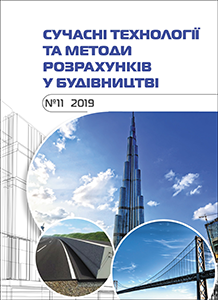Research of the effect of bioplast plasticizer on the properties of concrete mixture
DOI:
https://doi.org/10.36910/6775-2410-6208-2019-1(11)-04Keywords:
plasticizer, biotechnological additive, mobility of concrete mix, compressive strengthAbstract
At present, the vast majority of concrete mixtures are made using plasticizers, which increase their mobility, convenience, reduce the energy and labor costs when enclosing monolithic building structures, facilitate the intensification of the technological cycle, and enhance the quality of structures.
There is a large number of types of plasticizers, but in Lutsk at the “Microbioprom” from the steamed molasses bards, which is a secondary waste of bioethanol production, an ecological biopolymer plasticizer Bioplast-1 was obtained, the properties of which have not yet been studied.
The plasticizer is made on the basis of environmentally safe biopolymers that form useful, safe microorganisms - cellulose type, lignin-pectin type (microfibre), hydrocarbon, protein type (polymer molecule), alkali metals (potassium, sodium), alkaline earth metals (calcium, magnesium), phosphorus compounds and other biocomponents. Bioplast-1 is a dense syrup liquid of dark brown color with a concentration of substances of 50 - 60%, a density of 1,25 - 1,29 g / cm3. It is used for the production of prefabricated reinforced concrete pre-stressed and monolithic structures, for use in non-aggressive and aggressive gas and water environments.
In the paper the influence of the plasticizing ecological additive from the alcoholic waste production on the mobility of the concrete mixture and the strength of the concrete cubes is considered. The work also establishes the criteria and properties of a plasticizer additive.
The work was carried out in two stages: the first stage consisted in the study of the plasticization effects of the additive "Bioplast-1" on the concrete mixture; The second stage included the determination of the effect of the additive on the strength of concrete cubes.
The study of the effectiveness of the additive was performed to determine the main effect, to achieve which the additive is intended and an experimental refinement of the optimal dosage of the additive.
Plasticizer Bioplast-1 corresponds to plasticizers. The use of an additive at a concentration of 0,35 - 1,0% of the mass of the cement, causes an increase in the mobility of the concrete mixture in two stages - from P1 to P3


